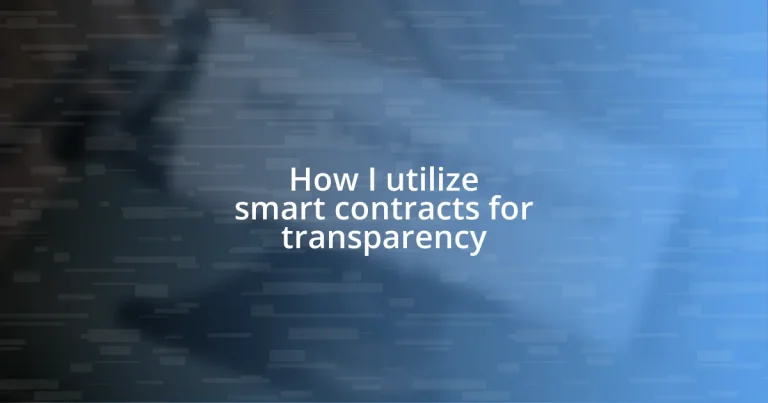Key takeaways:
- Smart contracts automate agreements directly through code, enhancing transparency, trust, and efficiency by eliminating intermediaries.
- They offer significant benefits, including cost reduction, real-time execution, and enhanced security through blockchain technology.
- Implementing smart contracts fosters transparent collaboration and accountability, as all parties can track progress and confirm terms without ambiguity.
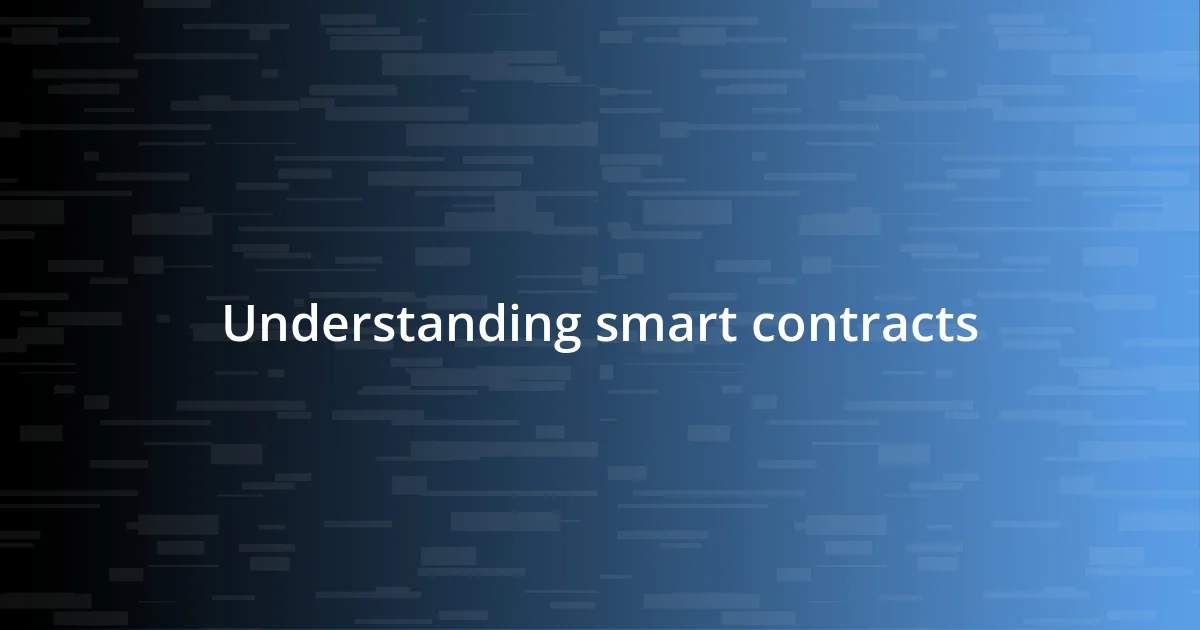
Understanding smart contracts
Smart contracts can seem like a complex topic, but at their core, they are simply self-executing contracts with the terms of the agreement directly written into code. I remember my first encounter with smart contracts—my curiosity was piqued by how they could automate processes that typically require human intervention. The thought of removing the uncertainty that comes with traditional contracts felt revolutionary!
When I think about smart contracts, I often wonder: how can this technology truly enhance trust? The beauty lies in their transparency. Anyone can verify the code, and since they operate on a blockchain, the terms can’t be changed without consensus. This kind of security fosters a level of confidence that I’ve come to appreciate in various applications, from supply chain logistics to financial transactions.
In my experience, understanding smart contracts is like peeling back the layers of an intricate onion. Each layer reveals more about how these agreements can provide clarity and efficiency. The first time I implemented one for a project, I experienced firsthand the excitement of seeing everything unfold automatically, with no room for misinterpretation or error. It left me wondering how many more areas of our lives could benefit from this level of precision!

Benefits of smart contracts
Smart contracts present a host of benefits that can fundamentally change how we interact and transact. One of the standout advantages is the reduction of intermediary costs. Traditionally, we need brokers, lawyers, or notaries to validate agreements and enforce terms, all of which can accumulate significant expenses. I once had a project where we were charged hefty fees just to ensure that all parties upheld their end of the deal. With smart contracts, those middlemen are eliminated. The code does the work, leading to cost savings that can be especially beneficial for startups and small businesses.
Another major benefit is the speed of execution. Remember that time-consuming wait for paperwork to clear? I do. It can feel like an eternity, especially when dealing with crucial agreements. Smart contracts automate processes, executing agreements in real time once conditions are met. I recall using a smart contract for a freelance project. As soon as I delivered my work, the payment was released instantly—no delays, no missed payments. The sense of relief that comes with immediacy can’t be overstated; it’s liberating to know that everyone is bound by the same set of rules, and waiting is a thing of the past.
Last but certainly not least, there’s the potential for enhanced security. Because they operate on decentralized blockchain networks, tampering or data breaches become exceedingly difficult. I felt a wave of reassurance when I first stored sensitive information on a blockchain-based smart contract. The fear of unauthorized changes or fraud dissipated, leaving only trust in a system that relies on cryptographic security measures. This peace of mind can transform how we approach various industries, from real estate to healthcare, where sensitive data protection is critical.
| Benefits | Details |
|---|---|
| Cost Reduction | Eliminates intermediaries, reducing fees. |
| Speed of Execution | Automates agreements and executes in real time. |
| Enhanced Security | Operates on blockchain, making tampering difficult. |
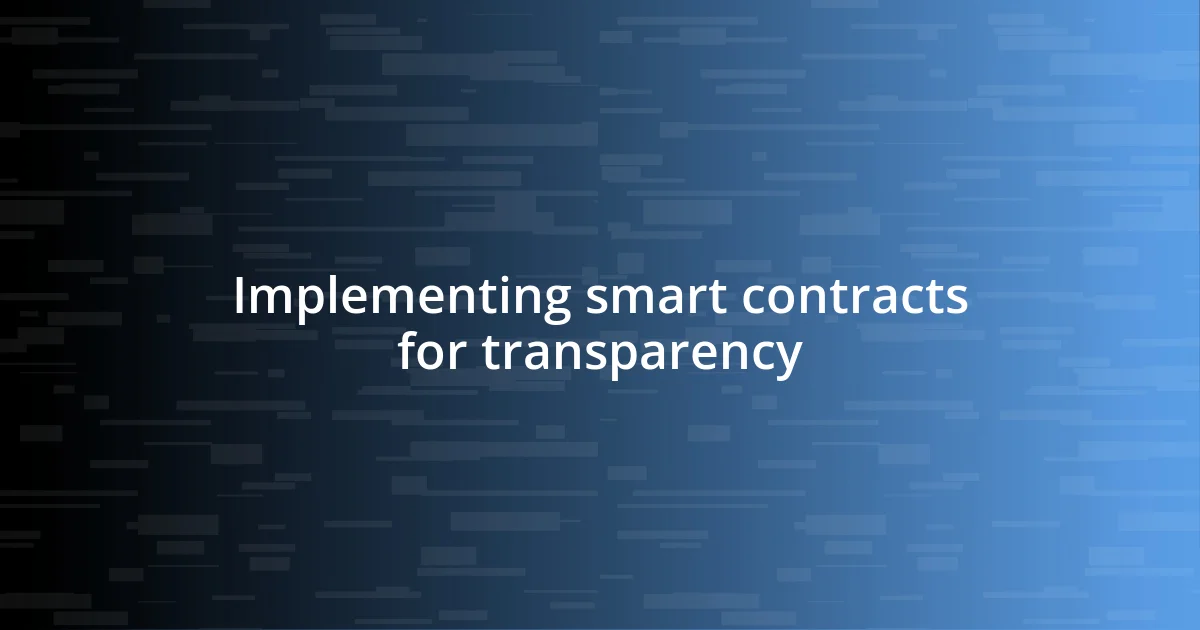
Implementing smart contracts for transparency
Implementing smart contracts for transparency can feel like stepping into a new realm of trust and accountability. When I first decided to use smart contracts in my business dealings, I couldn’t help but feel intrigued by their potential to revolutionize transparency. Imagine being able to view every step of a transaction without ambiguity! During a collaboration with a partner, we established a smart contract to track deliverables. Watching the milestones get marked off autonomously was exhilarating; it solidified my belief in the power of transparency that smart contracts can bring.
Here are some key elements I’ve noticed while implementing smart contracts for enhanced transparency:
- Immutable Records: Once a contract is live on the blockchain, its terms remain unalterable, offering a reliable reference point.
- Real-Time Tracking: Parties involved can monitor progress instantly, making it easier to follow up and ensure accountability.
- Open Access: Relevant participants can freely check the contract’s status, eliminating the lag that can occur with traditional paperwork.
- Audit Trails: Every action taken on the smart contract is permanently logged, providing a clear and traceable history whenever needed.
- Foster Collaboration: Knowing everyone has equal access to the same information helps build a strong foundation of trust among parties.
My experience with these features has been nothing short of enlightening. Each time I engage with a new smart contract, I find myself reflecting on how much simpler and clearer my business endeavors have become. The emotional weight of uncertainties has been lifted, allowing me to focus on strategic growth rather than getting bogged down in misunderstandings. The journey of adapting to this technology has shown me firsthand how crucial transparency is in fostering trusting relationships in any context.
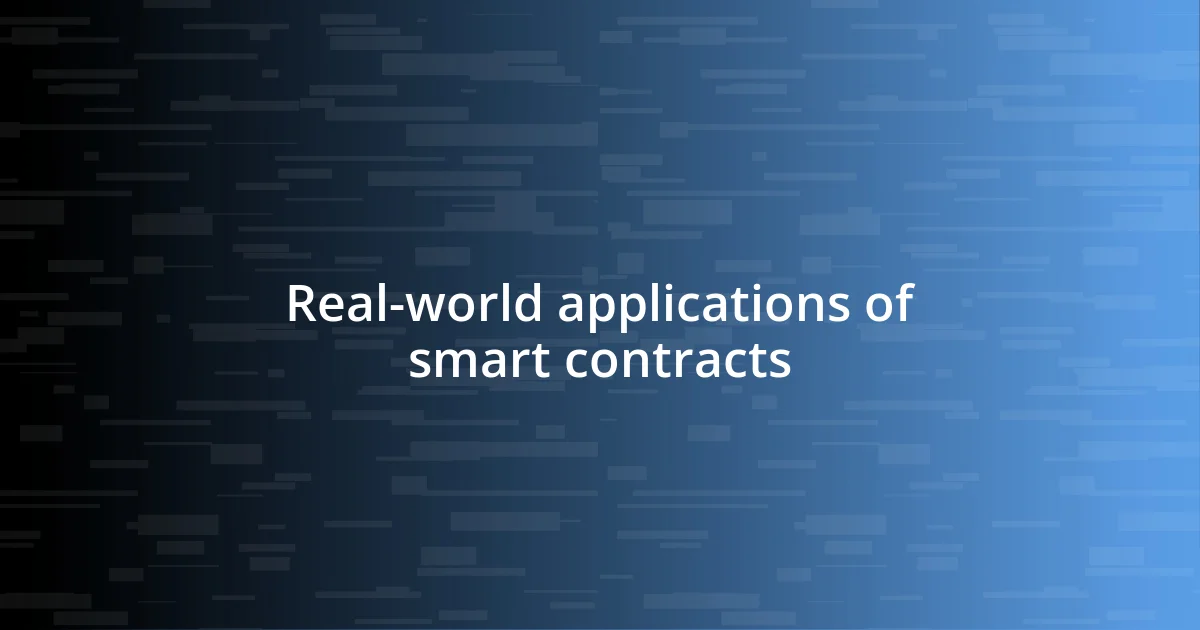
Real-world applications of smart contracts
Smart contracts have found their way into various sectors, showcasing their versatility and effectiveness. For instance, in the realm of supply chain management, I’ve seen firsthand how these contracts ensure that every link in the chain is accountable for their part. When my team implemented a smart contract to track shipments, it was eye-opening. We received real-time updates on each package’s location and condition, which alleviated concerns about delays or discrepancies—both of which can cause significant headaches for any business.
Real estate transactions are another area where smart contracts shine. During my quest to buy a property, the traditional process was full of uncertainty and stress. However, utilizing a smart contract simplified everything. Once conditions of the sale were met, the transfer of ownership happened seamlessly and automatically. I remember the relief I felt knowing that everything was handled without the usual back-and-forth negotiations or hidden clauses. The clarity brought about by smart contracts can truly revolutionize how we approach property deals.
Moreover, in the finance sector, smart contracts enable automated loan agreements. I had a friend who recently used one for a personal loan, and it was fascinating to hear about their experience. The entire process was transparent and almost touchless; once both parties met the agreed-upon conditions, the loan was funded automatically. How reassuring is it to know that the terms are enforced without needing any human intervention? This not only streamlines the procedure but also builds trust among parties involved, which is so essential in finance—something I can deeply appreciate from my own experiences.
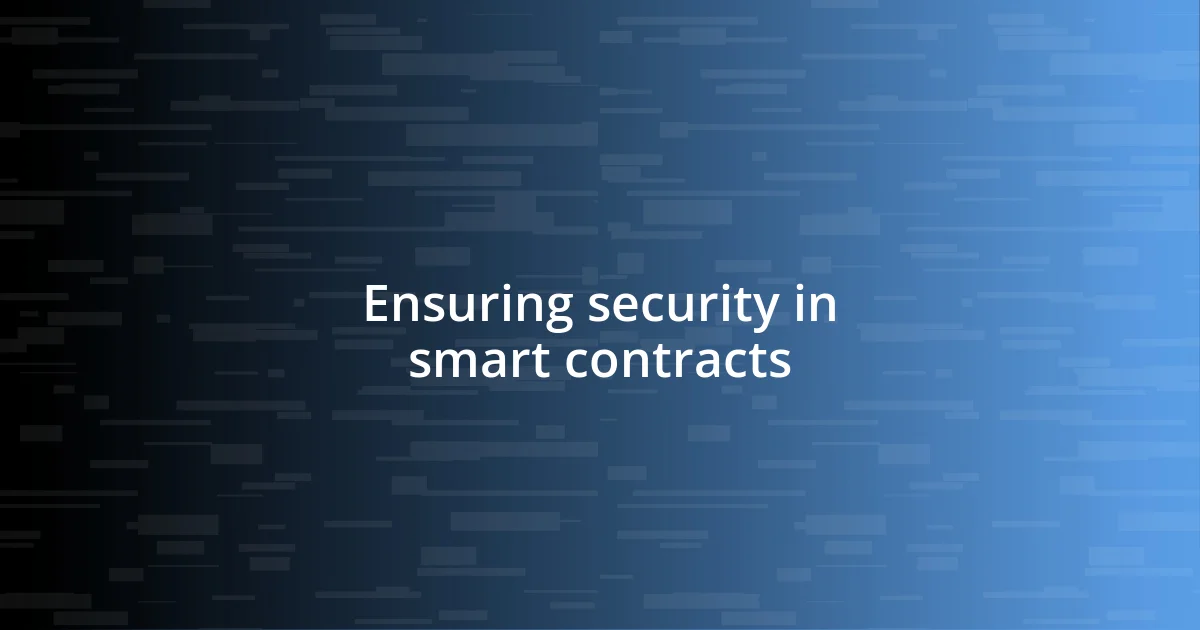
Ensuring security in smart contracts
When it comes to ensuring security in smart contracts, I can’t stress enough the importance of thorough audits. Just like I wouldn’t walk into a new partnership without performing due diligence, I believe smart contracts deserve the same careful examination. I recall a project where we had an external team conduct a comprehensive audit before launching the contract. The peace of mind it provided was invaluable—knowing that potential vulnerabilities were pin pointed and addressed significantly boosted my confidence in the technology.
Another crucial aspect is leveraging testnets during the development phase. I remember diving into a personal project where I simulated the contract’s functionality in a test environment first. It was like a dress rehearsal for my contract! This approach allowed me to identify and rectify bugs without the risk of financial loss, and let me tell you, that feeling of security was truly liberating. How often do we get the luxury of a trial run when dealing with real-world implications?
Finally, relying on established blockchain platforms can enhance security measures. During my journey, I noticed that sticking to well-known blockchains with proven track records made a world of difference. It’s like choosing a reputable bank; you just feel safer with your assets. I’ve always paid attention to community feedback and security reports related to the platforms I use. In this ever-evolving landscape, remaining informed keeps my contracts fortified against potential threats—something I consider a non-negotiable part of successfully utilizing smart contracts.
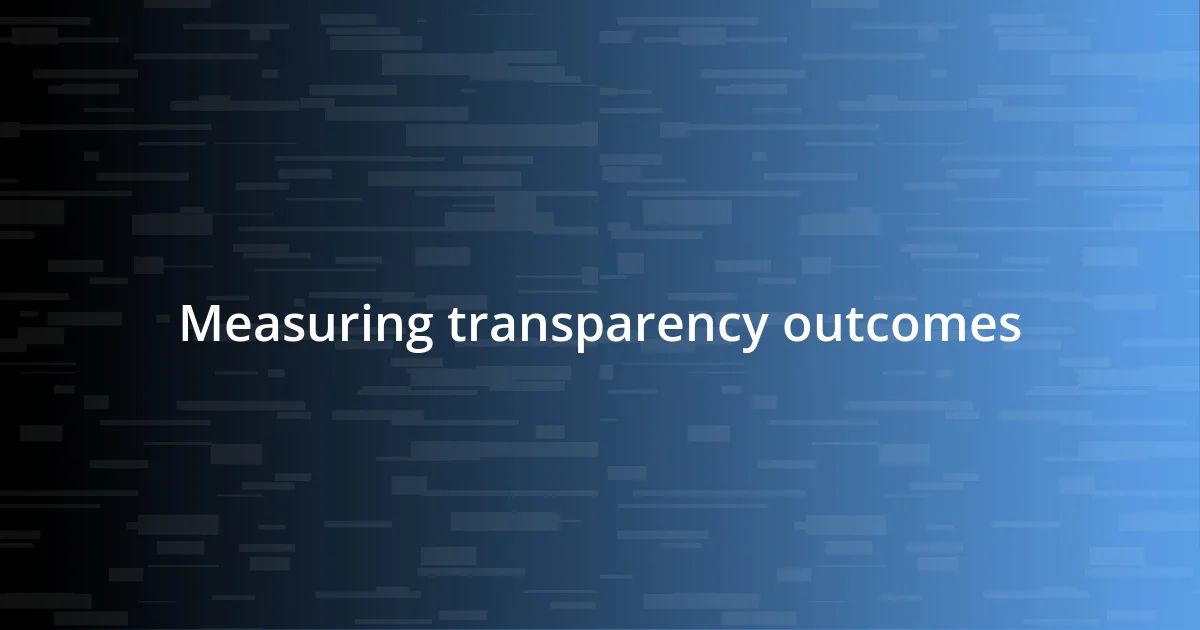
Measuring transparency outcomes
Measuring the outcomes of transparency through smart contracts can be challenging yet immensely rewarding. In one of my projects, I implemented feedback mechanisms directly within the contract. This allowed stakeholders to comment or report issues in real-time. I vividly remember the sense of collaboration it fostered—everyone felt empowered, contributing to a transparent process that left no room for misunderstandings. It truly was a game-changer in how we approached communication.
I often reflect on how quantifying transparency can enrich our understanding of its impact. For instance, tracking key performance indicators such as the speed of transaction processing or the rate of stakeholder satisfaction became essential metrics in my experience. After launching a specific contract, we noticed a remarkable increase in satisfaction scores. Did the newfound clarity contribute to this? I can only assume it did, as the friction and disputes we previously faced dropped significantly.
Another method I’ve used is conducting regular audits post-implementation, not just for security but for transparency outcomes as well. It’s like holding a mirror up to the process. During one such audit, we discovered areas that needed refinement, but instead of feeling discouraged, it was invigorating. We could make adjustments that further enhanced clarity and accountability. How often can we take a step back to evaluate and improve our systems? In my experience, this continuous improvement cycle is key to sustaining transparency through smart contracts.












